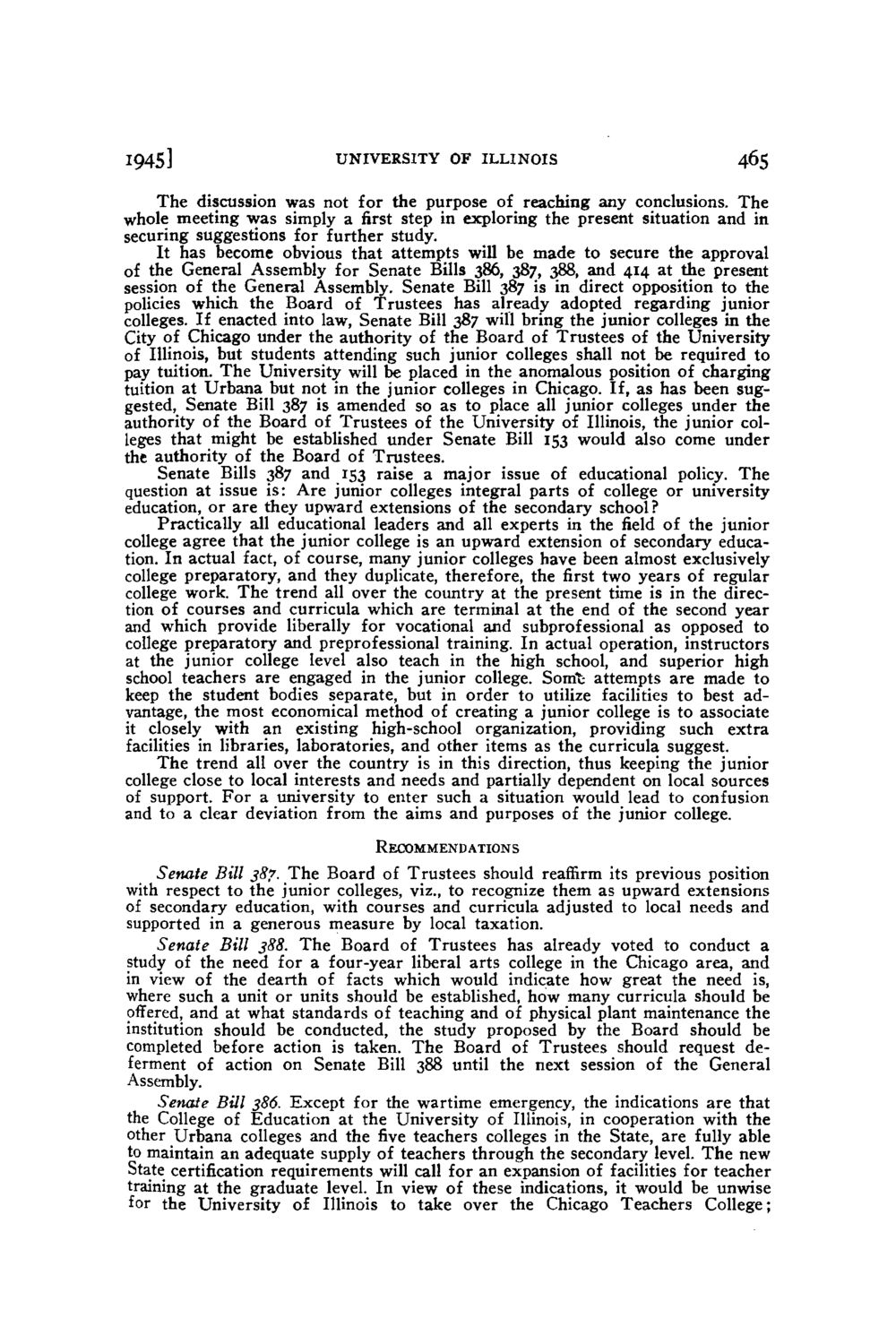| |
| |
Caption: Board of Trustees Minutes - 1946
This is a reduced-resolution page image for fast online browsing.

EXTRACTED TEXT FROM PAGE:
1945] UNIVERSITY OF ILLINOIS 465 T h e discussion was not for the purpose of reaching any conclusions. T h e whole meeting was simply a first step in exploring the present situation and in securing suggestions for further study. It has become obvious that attempts will be made to secure the approval of the General Assembly for Senate Bills 386, 387, 388, and 414 at the present session of the General Assembly. Senate Bill 387 is in direct opposition to the policies which the Board of Trustees has already adopted regarding junior colleges. If enacted into law, Senate Bill 387 will bring the junior colleges in the City of Chicago under the authority of the Board of Trustees of the University of Illinois, but students attending such junior colleges shall not_ be required to pay tuition. T h e University will be placed in the anomalous position of charging tuition at Urbana but not in the junior colleges in Chicago. If, as has been suggested, Senate Bill 387 is amended so as to place all junior colleges under the authority of the Board of Trustees of the University of Illinois, the junior colleges that might be established under Senate Bill 153 would also come under the authority of the Board of Trustees. Senate Bills 387 and 153 raise a major issue of educational policy. T h e question at issue is: Are junior colleges integral parts of college or university education, or are they upward extensions of the secondary school? Practically all educational leaders and all experts in the field of the junior college agree that the junior college is an upward extension of secondary education. In actual fact, of course, many junior colleges have been almost exclusively college preparatory, and they duplicate, therefore, the first two years of regular college work. The trend all over the country at the present time is in the direction of courses and curricula which are terminal at the end of the second year and which provide liberally for vocational and subprofessional as opposed to college preparatory and preprofessional training. In actual operation, instructors at the junior college level also teach in the high school, and superior high school teachers are engaged in the junior college. S o m t attempts are made to keep the student bodies separate, but in order to utilize facilities to best advantage, the most economical method of creating a junior college is to associate it closely with an existing high-school organization, providing such extra facilities in libraries, laboratories, and other items as the curricula suggest. T h e trend all over the country is in this direction, thus keeping the junior college close to local interests and needs and partially dependent on local sources of support. F o r a university to enter such a situation would lead to confusion and to a clear deviation from the aims and purposes of the junior college. RECOMMENDATIONS Senate Bill 387. T h e Board of Trustees should reaffirm its previous position with respect to the junior colleges, viz., to recognize them as upward extensions of secondary education, with courses and curricula adjusted to local needs and supported in a generous measure by local taxation. Senate Bill 388. T h e Board of Trustees has already voted to conduct a study of the need for a four-year liberal arts college in the Chicago area, and in view of the dearth of facts which would indicate how great the need is, where such a unit or units should be established, how many curricula should be offered, and at what standards of teaching and of physical plant maintenance the institution should be conducted, the study proposed by the Board should be completed before action is taken. T h e Board of Trustees should request deferment of action on Senate Bill 388 until the next session of the General Assembly. Senate BUI 386. Except for the wartime emergency, the indications are that the College of Education at the University of Illinois, in cooperation with the other Urbana colleges and the five teachers colleges in the State, are fully able to maintain an adequate supply of teachers through the secondary level. T h e new State certification requirements will call for an expansion of facilities for teacher training at the graduate level. In view of these indications, it would be unwise for the University of Illinois to take over the Chicago Teachers College;
| |